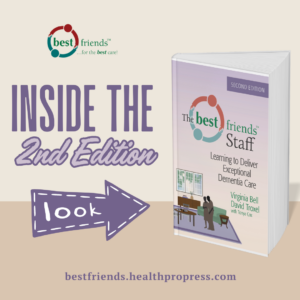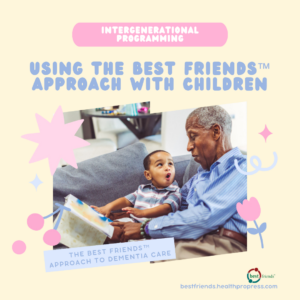
The Top 4 Things You Need to Know About Best Friends
People with dementia deserve the best care. And what they need most of all is someone dedicated to helping them feel safe, secure, and valued—at all stages of the disease. But being a dementia caregiver is an incredibly challenging role. The Best Friends™ approach is designed to help caregivers in this role, and it has proven effective in transforming care settings and improving the lives of both residents and staff.
So, what makes this approach so unique and successful?
What is the Approach?
The Best Friends™ approach is recognized as a best practice in Memory Care because of its positive outcomes. Caring for people with Alzheimer’s or a related dementia can be challenging, but using Best Friends makes the experience easier and more rewarding. Essential elements of this approach include knowing the history and preferences of each person, communicating skillfully, and providing a supportive environment and meaningful engagement. Anyone can learn how.
Why Friendship?
This person-centered philosophy is grounded in the understanding that relationships are supremely important in dementia care and should reflect the essential elements of friendship: respect, empathy, support, trust, humor. The concept of friendship is easy for staff to understand and apply.
At any stage of memory loss, receiving care from a “friend” makes a person feel safe, secure, and valued. It eases distress and disorientation and makes everything go smoother—from mealtimes to bedtime to social engagement and beyond.
Who Uses Best Friends?
Friendship is universal, and so is the Best Friends approach. Anyone who interacts with a person with dementia can learn the Best Friends way. From administrator to maintenance worker, from social worker to family member, and from nursing director to activity assistant—everyone can seize the moment to be a little less task oriented and a little more person centered when they know how to use the Best Friends approach.
This approach works in all settings where you find people with dementia, including:
- Nursing homes
- Assisted living
- Dedicated memory care
- Adult day programs
- Home care
- Community education and services
- Emergency medical services
- Senior centers
What Sets Best Friends Apart?
Adopting the Best Friends approach adds benefits and value to your care program.
- Staff satisfaction and retention—a caring culture is good for all
- Positive visibility—builds public confidence and trust
- Service excellence—produces better-quality programming
- Accountability—can be incorporated into quality improvement guidelines, fidelity of practice, and other evaluation metrics
- Risk management—helps minimize incidents and accidents
- Competitive differentiation—your program stands out from others
- Business improvement—more clients/occupancy, attractiveness to staff, improved outcomes





Add comment